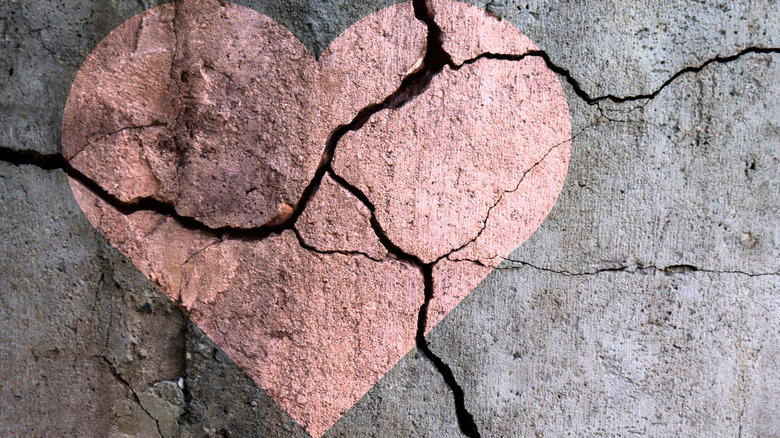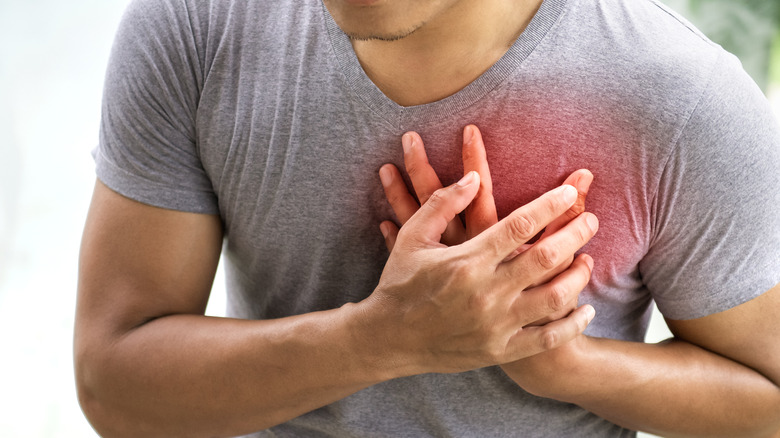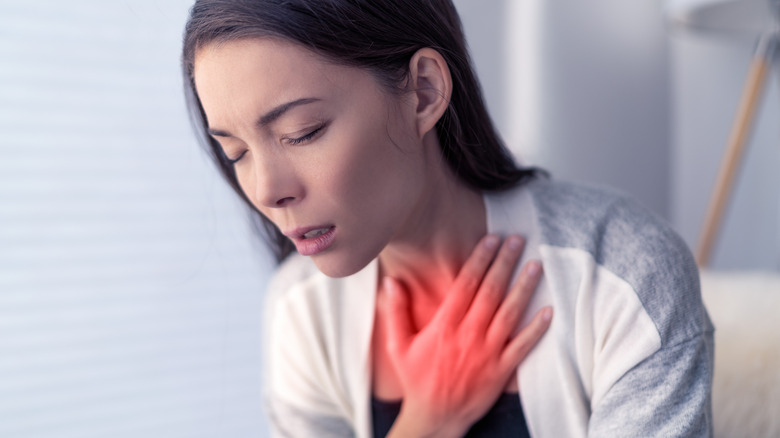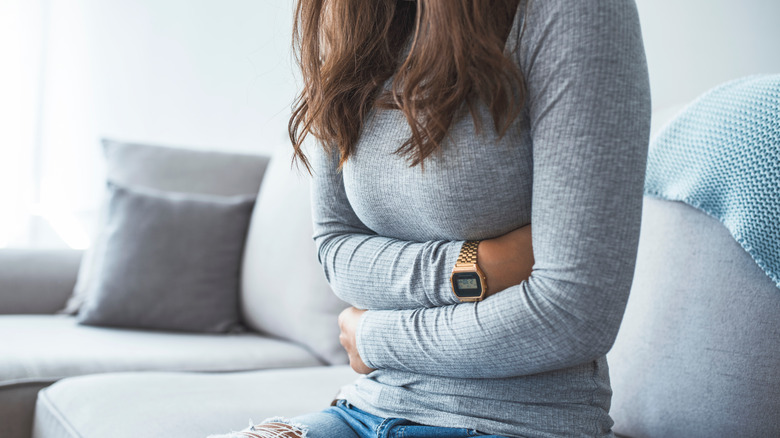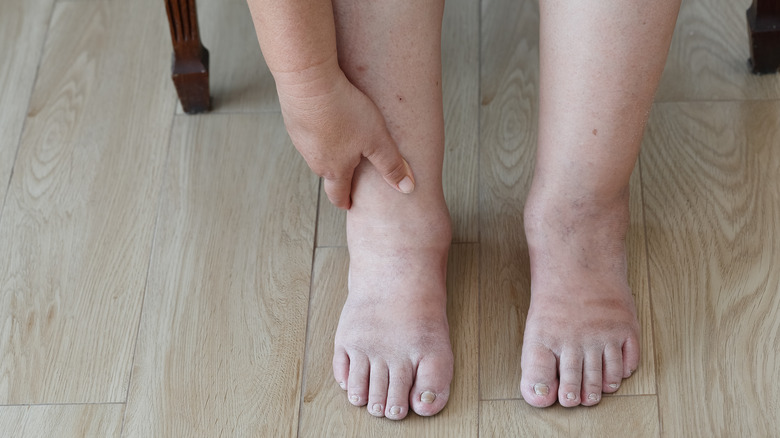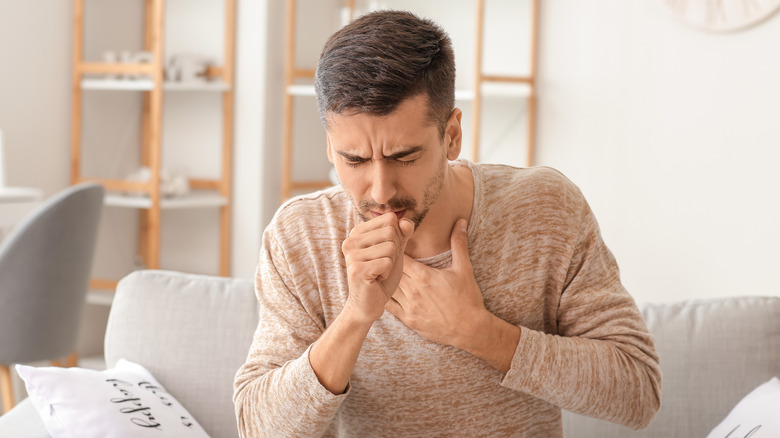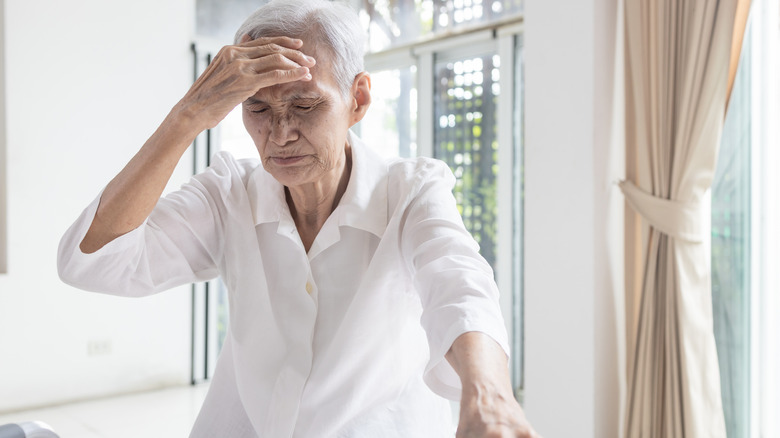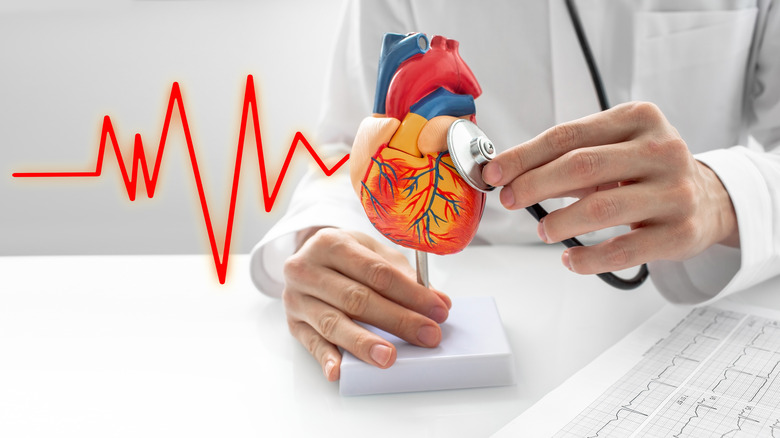Warning Signs Of A Heart Attack You Should Never Ignore
Heart disease is the literal leading cause of death among men and women in the United States (via Centers for Disease Control and Prevention). While coronary artery disease is the most common kind of heart disease, every 40 seconds someone in the Unites States has a heart attack, making it exceptionally common also. That is almost two heart attacks every minute! Fortunately, modern medicine has been able to increase the odds of heart attack survival by a lot. In fact, among people who were hospitalized for a heart attack, there is a 90-97% survival rate (per Verywell Health). Of course, the statistics vary based upon age, gender, the kind of heart attack, and the number of arteries involved.
Your arteries take blood and oxygen away from your heart in order for it to be pumped into other areas of your body. Heart attacks typically occur when there is a blockage of a coronary artery. Coronary arteries are the pathways that bring oxygenated blood to your heart muscle to keep it pumping. The damage of a heart attack is often determined by how long a section of the heart muscle goes without blood flow. Though many heart attacks are considered "silent," many come with a host of signs to alert you that something is amiss within your body. We've outlined the most common signs of a heart attack in hopes that you'll be able to help yourself or a loved one if a heart attack strikes — but fingers crossed it doesn't.
Chest pain
Perhaps one of the most commonly-understood signs of a heart attack is pain in the chest because, duh, that is where your heart lives. Though the signs and symptoms of a heart attack can vary greatly, chest pain is a leading sign of a heart attack, particularly in men (via Heart). Women can also feel chest pain and pressure, but they often experience other signs more aggressively. Chest pain in women is still cause for concern to be sure.
Chest pain can feel like a squeezing sensation, an ache in the chest cavity, and more (via Mayo Clinic). Important to keep in mind is that the chest pain associated with a heart attack can come and go. The amount of pain one feels in the chest can also vary; some people may not be able to go through the motions of their day to day life while having a heart attack, other people might just feel slightly unwell and be able to convince themselves that they are just coming down with something. The variation in symptoms is part of what makes identifying a heart attack at home so dangerous. The longer one goes without medical attention, the more lethal the damage can become.
Chest pressure
Chest pressure and chest pain are two sides of the same coin when it comes to heart attack signs. But chest pressure can present in a few different ways (via Heart). It might feel like someone dropped a 500-pound kettlebell on your chest — painful and uncomfortable, no doubt. It can also feel more like fullness in the chest, which can also lead to a lot of pain. Pressure within the chest cavity can feel like back pain as well (per Cleveland Clinic). This is yet another reason why it is important to take note of the common symptoms of heart attacks; the pain often appears in different locations that might not be as easy to identify as being related to heart troubles. Often, complications and issues within the lungs can cause pressure in the chest as well.
Persistent upper body pain of any kind is definitely something that is worth seeing a doctor for, especially if it is combined with any of the other known heart attack symptoms. When it doubt, experts urge you to err on the side of caution.
Arm pain
Arm pain, which falls under the umbrella of upper body pain, is another well-known and common sign of a heart attack (via Medical News Today). This is because the nerves that branch off of the heart and the nerves in the arms send their signals to the same cells in the brain, so the brain struggles to differentiate pains in these locations. This phenomenon is called "referred pain," and is startlingly common amongst people who have heart attacks. Therefore, arm pain — specifically in the left arm — is cause for concern when it comes on suddenly or strikes you as unusual. Though sometimes sudden arm pain can be the result of an injury, it is wise to seek medical attention if you experience this type of pain .
The presentation of arm pain during a heart attack can vary between men and women (via Norton Healthcare). In women, the pain can radiate to either side of the body and may be more mild. This often comes with a host of other signs. In men, however, the pain often occurs in the left arm and can travel up to the chin or down the length of the left arm.
Stomach pain
Many heart attack sufferers also experience stomach pain as one of the main signs that something is not functioning the way it should within their bodies (via Health Grades). Since heart attacks are usually caused by a blood clot clogging an artery, it is common to feel a cramping sensation in the chest while a heart attack is underway. But this cramping sensation can sometimes be felt in the stomach and not in the heart at all. That's right, you might not experience any chest pain with a heart attack, it might just feel like a stomachache! How scary is that?
As we all know, there are hundreds of other reasons why stomach pain could occur, be it from a late-night Nutella binge, drinking water out of a stream on a backpacking trip in Colorado, or from indulging in the spiciest Thai food you can find. It can be incredibly hard to discern the reason your stomach is hurting, especially when it is caused by heart troubles. Sometimes heart attacks can feel like acid reflux, and many people understandably confuse the two symptoms. It might be easy to overlook a stomachache as a sign of a heart attack, but experts encourage you not to wait to seek medical attention for unending mild to moderate stomach pains. This is especially true if your stomach pains come on with a side of any of the other heart attack symptoms.
Jaw pain
The way pain can be referred from the heart to other body parts during a heart attack is wild (via Healthline). Even pain in your jaw can potentially be a sign of a heart attack, though jaw pain is generally accompanied by other symptoms as well.
By itself, jaw pain on its own can be a sign of a minor teeth grinding problem, which you should still contact a dentist about. It can also signify more problematic issues such as disorders in the temporomandibular joint (TMJ) that links the jaw to the skull (and more (via Healthline). To be clear, some jaw pain is definitely not a reason to rush to call 911. You know your body best, so you know what tooth and jaw related pains are typical for you. But if your jaw pain comes on with numbness, vision problems, trouble speaking, and dizziness, it might signify a stroke. If the jaw pain presents with arm pain, chest pain, or other sudden and unusual symptoms, it is best to seek medical help. As always, if you are in doubt, it is best to seek out medical attention to get to the bottom of what you're feeling instead of waiting too long and suffering far worse repercussions.
Nausea and vomiting
Just like so many other signs of a heart attack, nausea and vomiting can be caused by myriad other ailments and complications, so there is no need to call an ambulance the moment you feel a wave of queasiness (per WebMD). This is especially true if there is an obvious cause of this isolated nausea and vomiting.
That said, sometimes a heart attack can lead to stomach pain, which can pave the way for nausea and vomiting. Interestingly, women are more likely to experience this symptom than men (via Heart). Furthermore, women are more likely to brush this symptom off, believing they have a flu or heartburn, and move forward in their day. Many women have explained that they did not know they were experiencing a heart attack. If you believe that you are at risk of heart problems and are experiencing this symptoms in tandem with others, contact a doctor or other emergency personnel immediately.
Shortness of breath
If you are running up a mountain and feel shortness of breath, you're human. But shortness of breath — or the feeling that you are unable to pull in a full, deep breath — can often be an early sign of heart trouble (via Mayo Clinic). The symptom often comes before the onset of chest pain. In other cases, shortness of breath might be the main sign that something is amiss, and it is a big sign indeed. Men and women can both experience shortness of breath as a sign of a heart attack.
If you find yourself at rest but panting to get the oxygen you need, call 911 immediately (per Health Grades). When it comes to heart attacks, every second counts when it comes to saving lives and preserving tissues. The fastest way to get treatment is by calling paramedics who will begin treatment upon arriving at the scene, not by having someone else drive you to the emergency room.
Extreme exhaustion
Extreme exhaustion goes hand-in-hand with shortness of breath. If you are unable to breathe properly, your body won't be receiving the oxygen it needs for your cells to thrive, and thus all of your bodily systems will suffer (via WebMD). If your normal day-to-day activities begin to make you feel fatigued, your body might be trying to tell you something (via WebMD). This can sometimes feel like shortness of breath after minor exertion, but it could also manifest as extreme weakness as you try to do the normal activities of daily living.
This is another sign that disproportionately affects women and it is, unfortunately, another sign that women overlook or misinterpret (via Healthline). The exhaustion can come on for even months leading up to a heart attack. So if you are feeling abnormally fatigued with no clear explanation (ie, you didn't spend the night partying or the morning at brunch with endless mimosas), it may be worth a trip to the doctor.
Cold sweats
Atypical sweating is another sign of a heart attack that might present prior to the actual attack taking place (via Healthline). For this reason, it is important to have a keen eye for sweating in ways that are unusual. Of course, sweating on a hot day or while exercising is normal, as sweating is your body's way of regulating its temperature. But sweating while you are not exercising may be cause for concern. This happens because as the affected artery or arteries begins to close, your body has to work a lot harder to pump freshly oxygenated blood through your system. This extra effort creates heat, which the body combats by sweating to keep your internal body temperature at its homeostatic set point. When this happens, it can often feel like a cold sweat that creates clammy skin, ack!
Women are more likely than men to experience excessive sweating during the night. Many women may attribute this symptom to menopause, but waking up with sheets drenched in sweat can signify out-of-the-ordinary heart troubles.
Swelling
Swelling, when it is unrelated to an acute or chronic injury, is another sign of heart problems that should be on your radar (via Medline Plus). But we repeat, if you fell down snowboarding, bonked your knee, and woke up with that joint resembling a melon, that is not cause for heart-related concerns. Also known as edema, swelling usually occurs in the legs, and sometimes in the abdomen, when it is related to heart problems. The swelling happens because with arterial blockage, the rate of fluid movement throughout the body slows. This can lead to a buildup of blood, specifically in the legs, which then translates to fluid retention throughout the surrounding tissues.
The swelling that might occur in the stomach can often be misinterpreted, like so many other symptoms, as simple weight gain. You know your body best, and if you are experiencing abnormal swelling, it is paramount that you check in with your doctor. If your ankles swell a lot in the evenings, it could be a sign that your body is retaining excess salt and water. Your kidneys and liver help flush fluid out, so swelling can be indicative of an issue with either of those organ systems as well (via Bass Advanced Urgent Care).
An unending cough
Generally speaking, a lingering cough is not a main sign of a heart attack. However, when an unending cough is coupled with one or more of the other signs, it is probably time to seek some medical attention (via WebMD). Additionally, if you already know that you have some form of heart disease or are known to be at risk, this is a symptom to be on the lookout for – especially if you also begin coughing up white or pink mucous.
A longstanding cough that is accompanied by white or pink mucous is a sign that the heart is not keeping up with the demands of the body, which causes blood to leak back into the lungs. From there, your body tries to expel it by coughing, and tinted mucous is the result. While it is a little bit gross, it is a good idea to keep an eye on the color of any mucous you cough up so you'll be tuned in to whether or not you need to see your doctor immediately.
Lightheadedness
Lightheadedness and dizziness are fairly common symptoms, and can signify a host of other conditions besides a heart attack (via WebMD). It is typical to experience lightheadedness after standing up too quickly, or faintness if you do not eat enough. It is also perfectly normal to feel dizzy and be unable to hold your balance after getting off of the spinning teacups ride at Disneyland (according to us it is also perfectly normal to vomit after that ride). As with most other heart attack symptoms, it is important to pay attention to the subtleties behind the signs. When in doubt, going to the doctor is always advised.
However, if you experience sudden dizziness or faintness accompanied by inexplicable chest pain or pressure, call an ambulance immediately. This also goes for faintness coupled with shortness of breath. Dizziness occurs in conjunction with a heart attack because the heart isn't able to pump blood, and therefore oxygen, throughout the body in the way that it is supposed to (via Penn Medicine).
Irregular heartbeats
According to WebMD, it is super normal and common to feel your heart skip a beat every so often. It is even more common, as you probably know, to feel your heart race when you are nervous or excited. But if your heartbeat is more consistently irregular, it might be time to take a deeper look. It is advisable to see a doctor if your heart beats out of time for more than just a few seconds, or if it happens frequently. Though too much caffeine or insufficient sleep is often the cause of heartbeat irregularity, you cannot bank on that diagnosis. If you are in doubt, it is best to check in with your doctor to ensure that you do not have atrial fibrillation, a heart condition that can increase your risk of other, and sometimes deadly, heart and health conditions (via WebMD).
If you have diabetes, known heart disease, a family history of heart disease, or lightheadedness or chest pain in addition to the heartbeat irregularities, it is definitely time to consult a pro. If you are having irregular heartbeats persistently, seek medical attention. But if the occasional skipped beat is your only symptom, UCI Health recommends trying yoga or meditation to soften the intensity of your heart rate.

